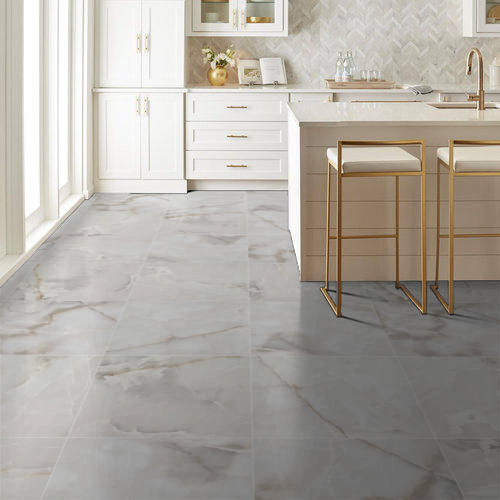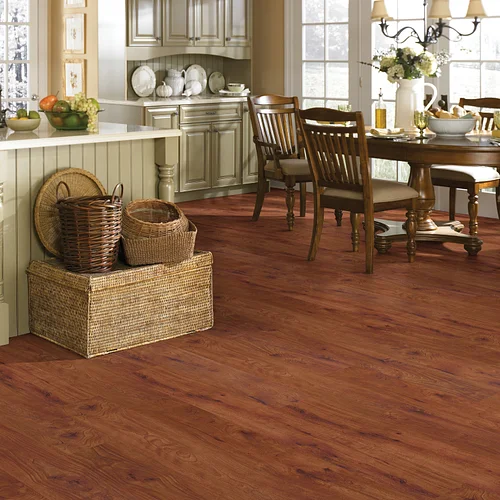Is Vinyl Flooring the Right Flooring Alternative?
Although vinyl flooring has always been an incredibly versatile, easy to install surface, today’s varieties are far from the common vinyl sheet roll that previously required messy glue. In fact, today’s vinyl flooring products are now much easier- and less messy -to install. Vinyl is still available in sheet form, but it is also now available in gorgeous, realistic plank and tile formats for enhanced realism.
With unique inherent properties and innovative engineering, vinyl flooring is a tremendously resilient surface. Naturally resistant to moisture, vinyl floors are an excellent fit for areas in the home like kitchens, bathrooms, laundry rooms, mudrooms, and basements where the potential for spills and standing water is higher. You just may find that vinyl flooring is the right flooring alternative to hardwood, natural stone, or tile!
Is Vinyl a Good Alternative to Tile?

If you are considering installing new tile floors in your home, you are probably in the market for a durable surface that can withstand all of life’s adventures. Tile is an excellent option since it is sturdy, reliable, moisture resistant, harder to scratch, and very easy to maintain with simply sweeping and mopping. However, tile can also present a much higher price point to purchase as well as a more expensive, tedious, and complicated installation process. Installing tile requires mortar and grout work, which will take hours to set and can be tremendously messy. Grout can also weaken the tile floor over time, crack, allow moisture and food to seep through.
With luxury vinyl tile, you not only do not need any mortar for the floor, there is no grout work! If you are after a realistic-looking finished floor, you can explore vinyl products that offer a visible grout line look. These vinyl tiles will simply use click-lock technology that installs just like tongue-and-groove flooring technology. The finished floor is still one continuous waterproof floor, it just looked like it features grout. Exceptionally easy to care for, your vinyl floor can be swept and mopped but will not require extra work with a grout brush or grout cleaner.
Is Vinyl a Good Alternative to Hardwood?

Although you may love the natural look of hardwood floors in your kitchen, this porous material is not best fit for the damp conditions that can easily often occur. An engineered hardwood flooring product can better serve your kitchen or bathroom where spills, steam, and droplets can touch your floors, but you need to ensure with the flooring warranty that you are installing a surface that is suitable.
We recommend at the very minimum to shop for a floor that will click together to form a continuous floor, engineered to tolerate moisture, but not repeated or prolonged exposure. Even if your flooring product is not completely waterproof, the core will most frequently be HDF, or high density fiberboard, which is made from wood.
You will be amazed at the authentic, rigid texture that allows vinyl plank flooring to emulate genuine hardwood planks. These resilient surfaces are not affected by moisture, which in turn makes them excellent for use in any room in the home. Available in just as many tones, finishes, and species as actual wood floors, you can find the trending wood visual to complete your spaces or match the home easily. In addition to rustic, distressed varieties for supreme realism, you can explore a chevron or herringbone installation layout for added appeal.
Want to learn more about wood and tile flooring alternatives? Make sure to contact our expert staff at CarpetsPlus COLORTILE of Hutchinson. We can help you discover different options, suggest a flooring solution that works for your preferred style and fits your budget, set up your installation, and help get your kitchen flooring upgrade completed efficiently.









